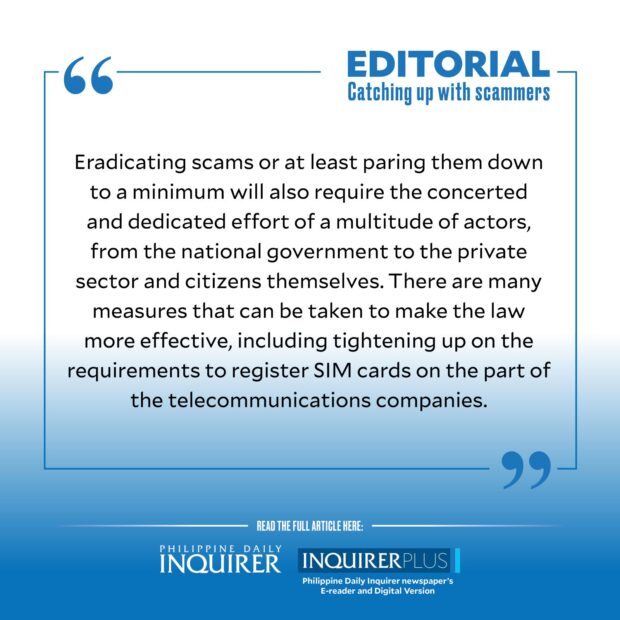Catching up with scammers

President Marcos signed Republic Act No. 11934 or the SIM Registration Act of 2022 with the promise that the registration of subscriber identification module (SIM) cards would minimize—if not altogether eliminate—scams and fraud being perpetrated using the ubiquitous mobile phone, as criminals will no longer be able to hide behind their anonymity.
The recent raids of Philippine offshore gaming operators (Pogos) facilities in Tarlac and Pampanga, however, yielded a gold mine of SIM cards that authorities suspect had been used to perpetrate fraud and elaborate love, cryptocurrency, and other investment scams.
This only heightens concerns consistently raised over the past two years about glaring “loopholes” in RA 11934 that had allowed text scams and fraud to continue unabated.
This means that hapless Filipinos continue to be victimized through phishing schemes that trick them to hand over sensitive information that can be used to empty their bank accounts or take over their identity and then commit nefarious acts.
Sen. Sherwin Gatchalian, coauthor of RA 11934 , already berated the National Telecommunications Commissions (NTC) for “sleeping on [the] job” and called on it to rigorously implement the law’s provisions.
Text scams and phishing
Last April, he made a similar call, urging the NTC to rigorously enforce provisions of RA 11934 following the retrieval of a substantial number of SIM cards during a series of raids against Tarlac-based Pogos.
A search of the office of Zun Yuan Technology Inc. last March 22 and 23, for example, yielded assorted SIM cards as well as hundreds of cellular phones and digital devices. SIM cards were likewise recovered from the opened safety vaults, which means that these SIM cards may have been used for criminal activities.
Also last April, Senate Minority Leader Aquilino Pimentel III already called for a review of “loopholes” in RA 11934 as fraudulent text messages had multiplied even with the mandated registration of all SIM cards in the country, pointing to the emergence of new technologies to proliferate text scams.
RA 11934 was the first law signed by Mr. Marcos, an indication of its importance in curbing crimes committed with the aid of electronic communication such as text scams and phishing, one of the more common forms of digital scams in the Philippines.
Not a ‘silver bullet’
Without question, having the law in place will go a long way in the fight against cybercrimes as there is now greater accountability over SIM cards and the government has the legal basis for going after their misuse.
The NTC also correctly pointed out, the law is not a “silver bullet” that will magically put an end to text scams and fraud, even if some 118 million postpaid and prepaid SIM cards have already been registered. Senate President Francis Escudero, however, said that instead of giving excuses, the agency should explain why it has been ineffective.
Eradicating scams or at least paring them down to a minimum will also require the concerted and dedicated effort of a multitude of actors, from the national government to the private sector and citizens themselves.
There are many measures that can be taken to make the law more effective, including tightening up on the requirements to register SIM cards on the part of the telecommunications companies.
Photo of a monkey
In a 2023 hearing, for example, authorities demonstrated during a legislative hearing how an ID card bearing the photo of a monkey was enough to register a SIM card.
The NTC and the telcos should therefore make the process more thorough so that only legitimate users will be able to have their SIM card registered.
Another proposal from the Department of Information and Communications Technology that is worth considering is limiting the number of SIM cards that can be registered under one name. It is indeed suspicious if a person will have hundreds of SIM cards registered under his or her name.
The government should also penalize individuals who are selling their registered SIM cards that end up being used in fraud. This after the cybercrime division of the National Bureau of Investigation revealed that online gaming operators have been buying registered SIM cards from unofficial sellers at just P40 each.
Individual users can also do their part to protect themselves by becoming more aware of the ever-present risk of being scammed online, as suggested by Scam Watch Pilipinas, an advocacy group whose purpose is to educate Filipinos on the dangers they face once they go online.
Vigilance by all stakeholders should indeed not falter because even as systems and processes are improved to fight current problems, cybercriminals are always on the lookout for new ways to commit these acts. If they are smart, then the government as well as individuals must be smarter and more vigilant, too. As Sen. Grace Poe said, the NTC should be “more proactive than the scammers.”




















